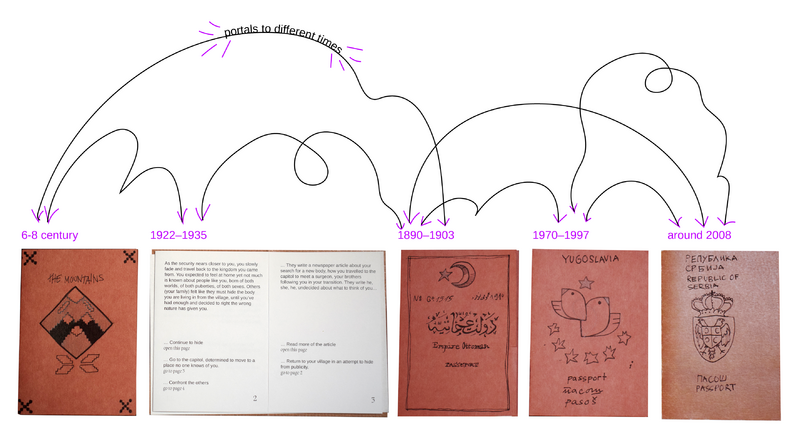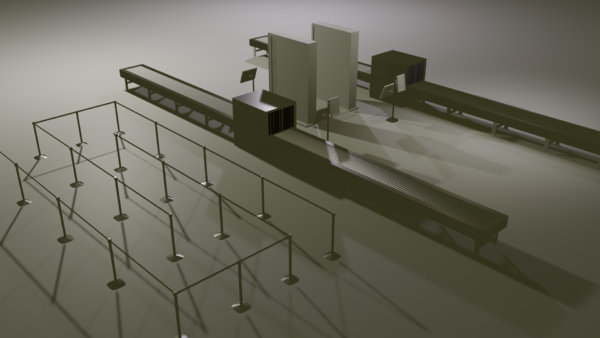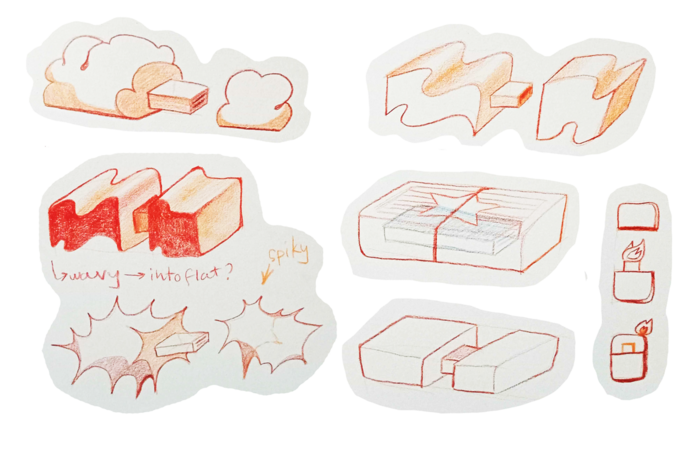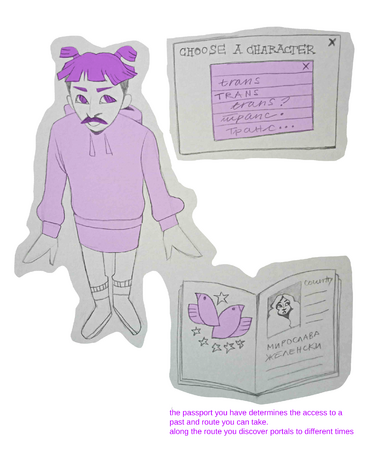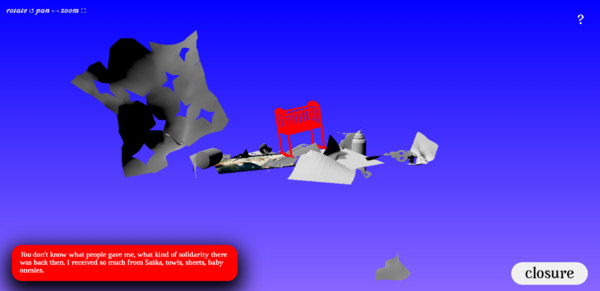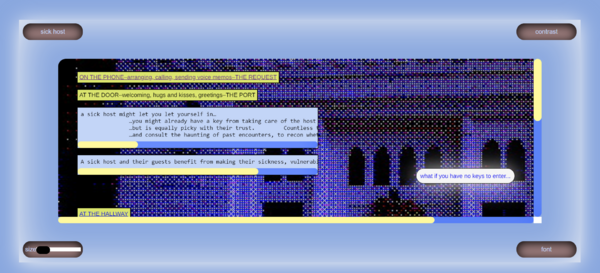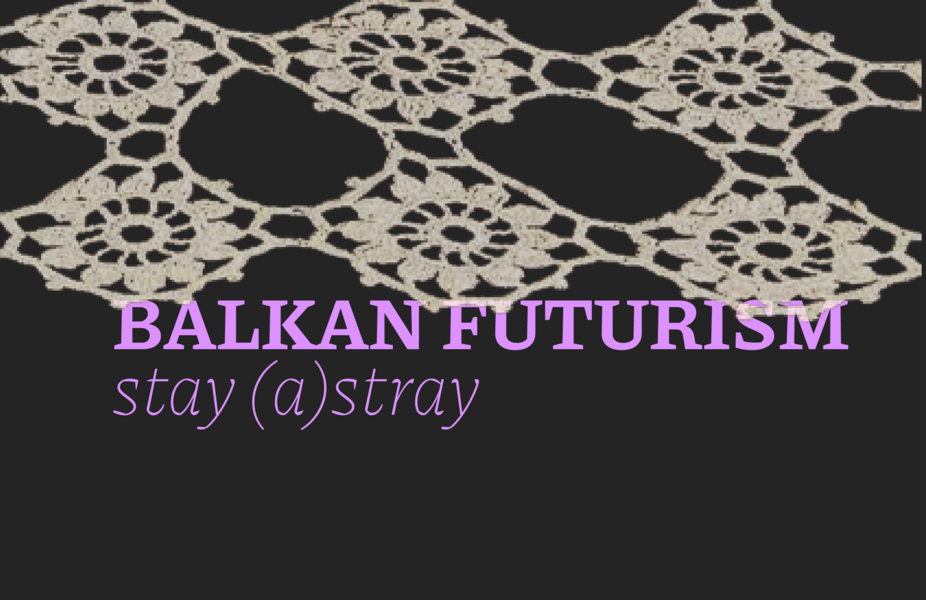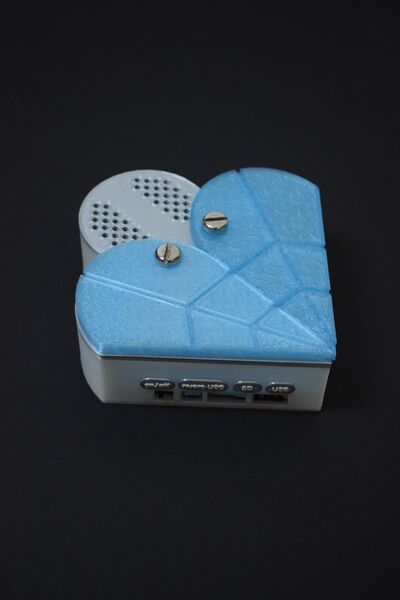User:Senka/Project Proposal
What do you want to make?
My project is an interactive digital narrative about queer histories in the Balkans, something close to but not quite a game. It counters a popular notion in the Balkans that local queer people and communities are an export of the "rotten West". This is unimaginative at best, and violent and detrimental at worst (also blatantly false and just dumb). Through this project, I will be exploring what the political imaginary of queerness in the Balkans could be.
The narrative will make use of non-normative or non-linear time (time-travel, loops in space-time) and 3D models, and will include text while not being solely text-driven.
Depending on the public's interactions with the work, they will encounter different elements of archival information embedded into the narrative (and in this way distributed). A distributed archive needs to see if the public is safe first, it wants to share information with those that need it, while still not risking the archive itself*. Though distribution the archive includes the public as witnesses and potential archival cogwheels. At the end of each journey, the person will be able to save the information as a compiled PDF, which they can distribute. The output will have different content based on each set of interactions. The fluid changing output allows the public to think about what access they receive based on their interactions and assumptions, and it hopefully gets people to think about ‘the road not taken’ and return to the game. It aims to prompt the public to compare the information they received with their friend and spark a conversation about this topic.
The thesis would serve as a backbone to the project, by providing the text for the narrative structure the project, possibly in a slightly edited format in order not loose narrative-immersion.
* A centralized archive is more accessible, but a distributed one is safer. And in the case of this sensitive material access must be learned through trust.
How do you plan to make it?
A minimum viable product that transmits the message is a digital choose-your-own-adventure game that allows you to discover different histories and gives you the option to download the journey you’ve taken in asa compiled PDF. The MVP would be entirely digital and focus on the narrative, a moderate amount of 3D worldbuilding, and getting archival information. It will include a regular interaction with a mouse, keyboard and screen. This is described in detail in section 1).
If this is done, then I will work on a more elaborate idea of the distribution outside of the digital realm 2).
1)
The storyline will start from the airport as a site where both national and gender identity are examined and put under scrutiny. The journey from there will include elements of a choose your own adventure game, and instead of travelling through space it will allow for travelling across time.
I will try to experiment with the following methods to write the narrative/storyline:
- Cybertext (In the sense that the medium of the narrative will be a defining way in which the story will be shaped, and it will require work from the reader to engage with interactive obstacles to fully experience it)
- Theory fiction (Writing that offers alternate ways of exploring and asking questions about relations between the fictitious and the actual world, it merges theory, philosophical concepts and fiction)
- Fictioning
- Critical fabulation (Saidiya Hartman’s method which uses historical information, archival material and fiction to do reparative work in the archives.)
- Imagination exercises: Since I will be exploring what the political imaginary of queerness in the Balkans could be, I want to facilitate what I’m calling ‘imagination exercises’ and indulge in fictioning with others to see what kind of information the narrative could contain, and what kind of distribution is necessary.
Choose your own adventure passports for travelling through time instead of space. The player is always trans, and always gets stopped by passport security (even if they come from a different time.) |
I will be using the languages of HTML, CSS, JavaScript, alongside with open-source software such as Blender (for 3D modelling), and experiment with Godot, Bitsy and Pico8 (for game design).
Disobediant interfaces that include friction in the narrative |
I want to use 3D to build worlds and tell stories through landscape in a less text-driven manner. I want to discover the potential of constructing counter-narratives (to those that exist about queer people) using more than words. I find digital 3D an ample medium to explore critical fabulation beyond words (that don't follow the hero narrative Ursula K. Le Guinn warns about in the Carrier Bag of Fiction theory).
I will have testing sessions with both queer and cishet people from the Balkans and people living in the Netherlands. Some of these sessions will be conducted online, and some in real life, to accommodate people living in either place.
2)
In terms of distribution, I want this project to reach many people and to be something that a person can intimately interact with. Somehow, I’m most driven to think it might work best in the comfort of one’s own home, although I would love to have it as a work that can be distributed through queer networks/initiatives. I would like it to combine a gallery set up and a more intimate form of distribution.
USB design for possible 3D printing and possible interface |
Possible modes of distributing output I would like to test:
- Connecting to a printer and printing information as the person plays
- 3D printing USB sticks or USB keychains which would contain the game
What is your timetable?
Sept–Oct:
- Contact and meet with researchers
- Read like your life depends on it
- Write a myriad of research questions to further locate the exact one
- Get to know different printers better
Oct–Nov–Dec:
- Sketch physically, on paper or digitally using the Wacom.
- Afterwards, sketch and model scenes in Blender. (Start with the point of any travel (including one of into the past) - the airport. The places where identities of all kinds are policed, including trans ones.)
- Try working in Godot, Bitsy or Pico8
- Write down ideas about how a person interacts with the screen and sketch out prototypes
- Research and play with interesting interactions in Java script
- Write a tad (try to synthesize some of the things you've been reading into thoughts)
- Write down the narrative of the game
Jan
- Preliminary narrative ready
- Implementing 3D models
- Getting the game ready for testing
- Collecting the material that will be printed
- Make models for 3D printing?
- Thinking about how to make the work public (share it)
Feb—March
- First round of testing
- Adjusting based on feedback
- Debugging code
- Refining narrative
- Refining 3D models
April—May
- Second round of testing
- Adjusting based on feedback
- Debugging code
- Test paper
- Thinking about how the work will be made public in the graduation show
Why do you want to make it?
There is a whole history of overlooked queer practices and thinking that we are yet to find a vocabulary for in order to make sense of them. Different histories require different treatment, and copy-pasting activist approaches from a different context with a radically different history doesn’t fully work..
In a way, this project also aims to rethink how we engage, and deploy archival material, findings or how we speak about queer pasts that are full of gaps, uncertainties, violent histories, and were the subject of othering.
In terms of public, I want to be part of a current of queer Balkan artists, designers and thinkers who imagine and inspire a new future in being. So, this project speaks to the Balkan context and is looking towards there, but equally since it will be thinking about archival approaches and (in part) queer theory, I find that it would be interesting for practitioners working with archives here. (But the project will cater to queer people predominantly.)
Who can help you and how?
- Ana Milić - can help with research, and theoretical grounding in the post-Yugoslav migrant queer histories by facilitating a knowledge exchange between our research.
- Bojan BIlić - can help with research and theoretical grounding in post-Yugoslav queer topics with a possible interview.
- Milena Turajlić - can help with archival research and theoretical grounding in the Yugoslav imaginary by giving me a change to watch her triptych "Non-Aligned & Ciné-guerrillas".
- Louisa Teichmann - can help with 3D printing and game interaction. (I need to ask if I can 3D print at .zip again)
- Lidia Pereira - can help with resources about more political games and game interactions.
- Brin Žvan - can help with game design and thinking about queer post-Yugoslav histories through feedback, and interaction advice and testing.
- Luka D. Misiūnaitė - can help with narrative structures in games and Blender advisory through feedback, meeting and testing.
- Arimit Bhattacharya - can help with narrative structures in games and Blender advisory through feedback, meeting and testing
- Katayun Taraporevala - is a good person to talk to about non-western approach to queer histories (in the context of India)
- Nora Bekes - can help with narrative in print as a graphic designer whose work bridges typography, illustration, writing and more.
- Thijs, Alessia, Victor, Lorenzo and Bernadette - forming the game talks
- Özgür Koldaş from saltpeperpeace.com - can help by sharing their insights about archival approaches to queer histories in Turkey
Relation to previous practice
I've been obsessed with alternative ways of archiving and knowledge production for quite a few years now. From previous projects I would like to highlight Momentary Lapse in Memory, from which I’m building on using 3D for worldbuilding and learning how to handle memory and trauma within archives. This project focused on how archives weaponize personal memories to create grand narratives and build national identities. Which contributed to this project further diving into how the entire existences of queer people is weaponized and what alternatives there are.
From the Archival Crevices workshop and NFF research fellowship, I’m building on the first stepping stones of using fictioning and critical fabulation when encountering archival material. With the scavenger method (mentioned in the thesis), I hope to gain a more grounded understanding of the effects of all the counter-archival tools at my disposal in a non-Western context.
I've worked on more non-linear and fragmented narratives as a way of transmitting stories, knowledge, information in a variety of ways. One such project that I’m building from is the SI23 project sick host. From it I’m expanding on this idea of error as prolific, and what kind of parasitic practices could constitute a new status quo.
Similarly, from the project Balkan Futurism, I’m building on the possibilities of choose-your-own-adventure-games to be an amble ground for theory fiction. In this project I explored the political reality of not having a choice in text adventures, which prompted me to want to further explore how could I subvert expectations in regards to this medium.
From the SI24 project Fly on the Wall, I’m building upon creating handheld gadgets and 3D printing devices that can have political consequences. I want to expand on what effects 3D printing has when it is shared and distributed, and what added level of immersion it gives to a game.
Relation to a larger context
I want to join the practitioners who work on alternative (read: intersectional queer feminist) archival approaches to western knowledges. Here Saidiya Hartman is an obvious reference in terms of her reparative work in the archive along (2021) with Carmen Maria Machado (2018), who created an anthology of abuse within queer relationships, taking each chapter as an opportunity to experiment with narrative format and the effect it might have on the reader. Lastly, the work of Johanna Hedva in relation to advocating for different narrative structures for those who are mentally ill and think differently are ones I want to align myself next to (2016).
Additionally, I want to contribute to feminist Balkan thinkers who have conceptualized the political reality of the region (Todorova, 1997), how it is at the crossroads of othering and further others others (Bakic-Hayden, 1995) and how memory and narrative have been shaped by a turbulent and violent history (Ugrešić, 1996). I want to contribute here by reclaiming historical erasure while also fighting nationalistic currents of historical revisionism.
Aside from this, the practitioners working on reclaiming queer narratives from weaponization through fiction and worldbuilding are important to me. Ursula K. le Guin (1969) is an inspiration as she has brought queer and other political realities to the front and Octavia Butler’s work in Kindred (1979) and imagining the embodied effects of the past. In line with that, my strivings to find a vocabulary for non-Western queer discourse is part of a larger current. From 2010 onwards, there have been academics and artist working on this through different approaches and I would like to contribute to this with a lens that attempts not to reproduce knowledge form the Western context (Bilić and Milanović, 2014).
- Fighting homonationalist ideas of the non-Western contexts.
References/bibliography
Alreadymade. (2023) [Mp4]. Directed by Barbara Visser. The Netherlands: Tomtit Film and VPRO.
Bakić-Hayden, M. (1995) "Nesting Orientalisms: The Case of Former Yugoslavia". Slavic Review, Vol. 54, No. 4. pp. 917–931. Available at: https://www.jstor.org/stable/2501399 (Accessed: 21 October 2024).
Bilić, B. & Milanović A. (2022) "Uvod: U postjugoslovenskim trans svetovima". Postjugoslo/avenski TRANS: životi aktivizmi kulture. Multimedijalni institut: Zagreb. pp. 12–31.
Blagojević J. & Dimitrijević O. (2014) Među nama: Neispričane priče gej i lezbejskih života. Beograd: Hartefakt Fond.
Butler, O. E. (1979) Kindred. Boston: Beacon Press.
Burrows, D. & O’Sullivan, S. (2019) Fictioning: The Myth-Functions of Contemporary Art and Philosophy.
dys4ia. (2023) PC [Flash Game]. itch.io: anna anthropy.
Hartman, Saidiya V. (2021) Venus in Two Acts. Los Angeles, Calif, New York, N.Y.: Cassandra Press ; Museum of Modern Art.
Hartman, Saidiya V. (January 1, 2021) “Intimate History, Radical Narrative.” The Journal of African American History 106, no. 1. pp. 127–35. https://doi.org/10.1086/712019.
Hedva, J. (2016) "In Defence of De-persons". GUTS, Issue 6: Futures. Available at: https://gutsmagazine.ca/in/ (Accessed: 21 October 2024).
Kolev, K. (2023) "Yugoslavia's Digital Twin", The Dial, Issue 9: Weapons. Available at: https://www.thedial.world/articles/news/issue-9/yugolsav-wars-yu-domain-history-icann. (Accessed: 21 October 2024)
K. Le Guin, U. (1969) The Left Hand of Darkness.
Kosofsky Sedgwick, E. Paranoid Reading and Reparative Reading, or You're so Paranoid You Think This Essay is About You.
Keser Battista, I. (2023) 'Places, non-places, spaces', Zbornik radova Akademije umetnosti, (11), pp. 48-61. doi:10.5937/ZbAkU2311048B.
Lorenz, R. (2012) Queer Art: A Freak Theory.
Machado, C. M. (2018) In the Dream House. London: Serpent's Tail.
Milački, A. (2018) “Once Upon a Time in Yugoslavia”. The Avery Review 35. Available at: https://www.averyreview.com/issues/35/once-upon-a-time (Accessed: 21 October 2024).
Todorova, M. Imagining the Balkans.
The Yugoslawomen+ Collective. (2020) "The tale of ‘good’ migrants and ‘dangerous’ refugees." Yugosplaining the World. Available at: https://thedisorderofthings.com/2020/07/19/17977/ (Accessed: 21 October 2024).
Ugrešić, D. (1996) “The Confiscation of Memory”. New Left Review 218, pp. 26-39. Translated by Celia Hawkesworth.
Vidojković, M. (2017) E baš vam hvala.
Wilson D. & Sicart M. (2008) Now It’s Personal: On Abusive Game Design. Copenhagen: IT University of Copenhagen, Center for Computer Games Research.
Zvan B. & Schifter M. (2022) There is no Abusive Game Design: A typology of Counter Game Design. Copenhagen: IT University of Copenhagen.
2.22am. (?) PC [Game]. itch.io: umbrella-isle.
Burrows, David & O’Sullivan, Simon. (2019) Fictioning: The Myth-Functions of Contemporary Art and Philosophy.

